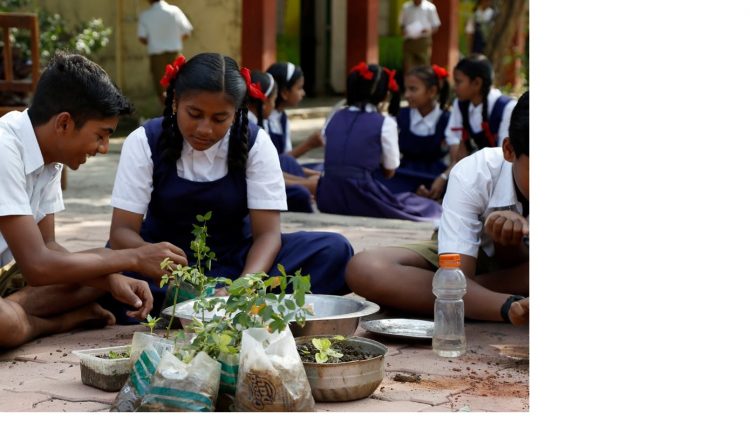NEW DELHI: At least one in seven school students across the world faced disruption in school education due to climate hazards in 2024, says a report by UNICEF, adding that 54 million students in India were impacted, primarily due to severe heatwaves that led to widespread closures of schools and changes in academic schedules.
The report titled ‘Learning Interrupted: Global Snapshot of Climate-related School Disruptions in 2024’ reveals that at least 242 million students in 85 countries – from pre-primary to upper secondary education – have experienced school disruptions due to climatic events in 2024, with South Asia emerging as the most affected region.
At least 128 million students in South Asia were affected in 2024, with India facing the highest impact, the report pointed out.
“Fast-onset hazards such as flooding, landslides and cyclones have repeatedly caused destruction to schools while environmental stressors like extreme heat and air pollution are harming children’s health and hindering their school attendance and learning outcomes,” the report said.
It highlighted that India, which ranks 26th out of 163 countries in the UNICEF Children’s Climate Risk Index, is extremely vulnerable to the impacts of climate change.
The children in India are facing significant challenges due to environmental stressors such as heatwave and air pollution, which are adversely affecting their health, school attendance, and overall learning outcomes. The illness caused by heatwaves and pollution disrupts their schooling.
“The world is grappling with two intertwined challenges –climate change and educational disruptions –that reinforce each other. Addressing both simultaneously is crucial,” the report quoted Pia Rebello Britto, UNICEF Global Director of Education and Adolescent Development, as saying.
Key takeaways from the UNICEF report
- At least 20 countries had nationwide school disruptions last year due to climate-induced disasters.
- 74% of the 242 million affected students are in low and lower-middle-income countries, with an average Children’s Climate Risk Index (CCRI) score of 7 out of 10.
- September was recorded as the most frequent climate-related school disruption wherein the majority of schools were closed at least in 18 countries.
- April saw the highest global climate-related school disruptions, particularly with heatwaves which affected at least 118 million children in Bangladesh, Cambodia, India, Philippines, and Thailand.
- In 2024, heatwaves were the most significant climate hazard worldwide leading to disruption in school education, that has affected an estimated 171 million students.
- In 2024, South Asia was the most affected region, with 128 million students facing climate-related school disruptions. East Asia and the Pacific region followed, impacting an additional 50 million students.
- Climate shocks are disrupting school education, putting children’s learning and their futures at risk. The report includes events like heatwaves, tropical cyclones, storms, floods and droughts in 2024.
- The UNICEF has called on governments, policymakers, and educational institutions to prioritise climate resilience in education planning.
Major recommendations
Infrastructure resilience: Investing in climate-proof school buildings and ensuring access to remote learning solutions during school closures.
Training of teaches: Equipping educators with the knowledge and tools to address climate change impacts in the classroom.
Policy integration: Incorporating climate change education into national curricula to raise awareness and foster preparedness among students.
The UNICEF said it has been working closely with the Indian government to integrate climate change education into the national curriculum. This initiative aims to raise awareness and prepare students to cope with climate-related challenges.
National Curriculum Framework
The National Curriculum Framework now includes elements of climate change education, guiding the development of state curricula, textbooks, and teaching practices.
The UNICEF is also supporting the government’s implementation of the Comprehensive School Safety Programmes (CSSP) in 12 states. These programmes aim to create safe learning environments while also empowering children to become agents of change in addressing climate-related issues.
As of 2024, more than 121,000 educators have been trained under these programmes to better equip them to teach climate change and resilience.
To further enhance teachers’ capacity in climate change education, a national teacher training module developed with UNICEF’s support, is set to be finalised in March 2025, the report said.
To see the full UNICEF report titled ‘Learning Interrupted: Global Snapshot of Climate-related School Disruptions in 2024’, click here.


Comments are closed.